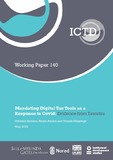| dc.contributor.author | Santoro, Fabrizio | |
| dc.contributor.author | Amine, Razan | |
| dc.contributor.author | Magongo, Tanele | |
| dc.date.accessioned | 2022-05-18T14:14:30Z | |
| dc.date.available | 2022-05-18T14:14:30Z | |
| dc.date.issued | 2022-05 | |
| dc.identifier.citation | Santoro, F.; Amine, R. and Magongo, T. (2022) Mandating Digital Tax Tools as a Response to Covid: Evidence from Eswatini, ICTD Working Paper 140, Brighton: Institute of Development Studies, DOI: 10.19088/ICTD.2022.006 | en |
| dc.identifier.uri | https://opendocs.ids.ac.uk/opendocs/handle/20.500.12413/17407 | |
| dc.description.abstract | Many tax authorities changed the mode of interacting with taxpayers from physical to online as a response to the Covid-19 pandemic, to diminish the spread of the virus. Eswatini, the country under study, mandated the use of online tax filing through the e-Tax system for all income tax payers, coupled with a zero-cash-handling policy for tax payment. By means of a difference-in-difference (DID) strategy, reinforced by a propensity score matching (PSM), this paper offers an impact evaluation of the mandate on taxpayer filing and payment behaviour.
We present three sets of results. First, we describe which firms are most likely to register for e-Tax – mostly large firms and those in the primary and tertiary sectors. Second, we show that e-Tax uptake significantly improves filing behaviour, as well as payment behaviour. E-Tax registered taxpayers are less likely to file nil (by 60 per cent), declare more turnover and taxable income, and are 70 per cent more likely to pay conditional on filing. Third, we shed light on the mechanisms behind our main findings, showing that the technology improved accuracy and reduced compliance costs. E-Tax-registered treated taxpayers are more likely to file on time, file for VAT, report more accurately, and, on the payment side, to pay their liabilities in full. | en |
| dc.language.iso | en | en |
| dc.publisher | Institute of Development Studies | en |
| dc.relation.ispartofseries | ICTD Working Paper;140 | |
| dc.rights | Attribution 2.0 UK: England & Wales | en |
| dc.rights.uri | http://creativecommons.org/licenses/by/4.0/ | en |
| dc.subject | Governance | en |
| dc.title | Mandating Digital Tax Tools as a Response to Covid: Evidence from Eswatini | en |
| dc.type | Series paper (non-IDS) | en |
| dc.rights.holder | Institute of Development Studies 2022 | en |
| dc.identifier.team | Governance | en |
| dc.identifier.doi | 10.19088/ICTD.2022.006 | |
| rioxxterms.version | VoR | en |
| rioxxterms.versionofrecord | 10.19088/ICTD.2022.006 | en |


